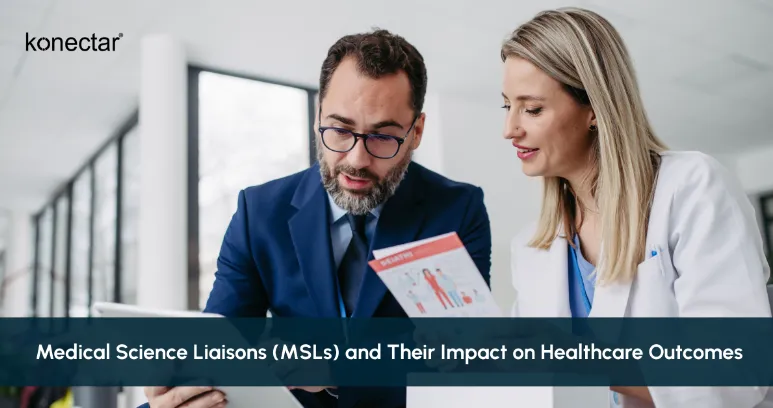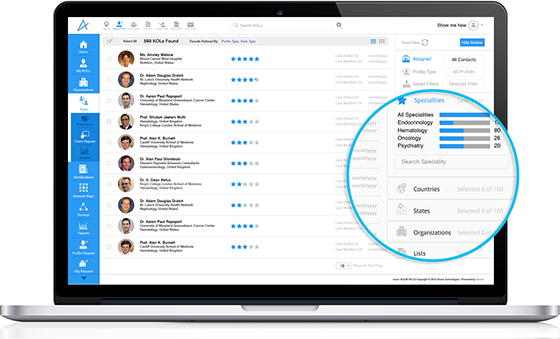01-10-2024
Medical Science Liaisons and Their Impact on Healthcare Outcomes

In an era of rapid advancements in healthcare and pharmaceuticals, the Medical Science Liaison (MSL) has emerged as a crucial link between pharmaceutical companies and the broader medical community. These professionals serve as the scientific face of their organizations, who help translate complex data into meaningful insights for healthcare professionals (HCPs), support clinical development, and shape the future of evidence-based care.
As the healthcare landscape grows increasingly complex, the role of MSLs will continue to expand both in scope and impact.
In this article:
Understanding the Role of Medical Science Liaisons
The MSL in pharma is typically a professional with advanced degrees, who specialize in specific therapeutic areas. The core MSL responsibilities include driving:
1. Scientific Communication in Pharma
MSLs are responsible for delivering unbiased, up-to-date scientific information about the company’s products, ongoing clinical trials, and research pipelines. They help healthcare professionals interpret new therapies and apply scientific findings to clinical practice.
2. Key Opinion Leader (KOL) Engagement
One of the most strategic aspects of the MSL role is identifying and engaging with Key Opinion Leaders (KOLs). These influential medical experts play an important role in shaping clinical practices and treatment guidelines.
MSLs collaborate with KOLs to:
• Gain feedback on new drugs or indications
• Identify unmet medical needs
• Support advisory board discussions
• Co-create educational content
This two-way communication ensures that the company’s development strategies are grounded in real-world clinical practice.
3. Clinical Trial Support
MSLs often contribute to the design and execution of clinical trials by:
• Identifying trial investigators
• Supporting site education and activation
• Facilitating patient recruitment
• Providing feedback to the clinical development team
They also relay real-world insights back to the research team to improve protocols and patient outcomes.
4. Scientific Collaboration
MSLs act as a bridge between healthcare providers and internal company departments, such as:
• Medical Affairs
• Market Access
• Brand Management
Their knowledge of the field helps shape internal decisions, from trial designs to go-to-market strategies.
MSL Challenges: What It Takes in the Modern Scientific Role
Staying current in a world where medical science evolves almost daily is no small feat. Those in this role are expected to keep pace with a constant stream of new data, from clinical trials to updated treatment guidelines. It’s not just about reading articles, it’s about deeply understanding the science, attending key medical conferences, and being ready to translate complex information into meaningful insights for healthcare professionals.
Talking about the digital transformation for MSLs. The shift to virtual engagement brought on by the pandemic added a whole new layer of challenge. Today, MSLs must be proficient in digital communication tools. They need to be capable of delivering compelling presentations over video calls and skilled at building trust remotely. While virtual formats have expanded their reach and efficiency, they also demand a shift in communication style and strategy.
Then there’s the tightrope walk of compliance. Unlike traditional commercial roles, this one is strictly non-promotional. Conversations must always stay grounded in science, and there’s little room for error when it comes to regulatory standards. Global and local compliance rules continue to evolve, and staying on the right side of them is an ongoing responsibility that requires both vigilance and integrity.
Digital innovation is also reshaping how MSLs operate. Artificial intelligence is now being used to analyze complex scientific literature, extract meaningful insights from clinical data, and tailor content for healthcare professionals in a personalized way. With modern HCP engagement platforms, MSLs can identify the right stakeholders, track their beliefs and sentiments, and derive actionable insights that enhance the impact of each interaction.
One such platform, konectar, empowers MSLs through AI-driven HCP management. It enables rapid identification of relevant KOLs, monitoring of digital opinion leaders, and development of data-informed KOL engagement strategies. By leveraging real-time insights, konectar helps MSLs drive more precise and effective engagement. To learn how konectar can elevate your HCP engagement strategy, request a demo today.
The Importance of MSLs in Drug Development and Commercialization
1. Clinical Development
In the clinical development phase, MSLs play a vital role by providing their expertise to ensure trials are conducted smoothly and yield relevant results. They help identify suitable trial sites and investigators who have the right resources and experience. MSLs also support the design of clinical protocols, ensuring that they are scientifically sound and practical for real-world implementation. Additionally, they work to ensure that trials include a diverse patient population, which helps ensure that results are applicable to a wide range of individuals.
2. Real-World Evidence (RWE)
Beyond clinical trials, MSLs are instrumental in gathering and analyzing real-world evidence (RWE). This involves collecting data from sources like observational studies, patient registries, and post-marketing surveillance. RWE helps demonstrate how well a product works in routine clinical settings, supports discussions with healthcare payers for reimbursement and formulary inclusion.
3. Product Launches and Lifecycle Management
MSLs are crucial throughout a product's lifecycle, from pre-launch to post-marketing stages. Before a product is launched, they educate HCPs on its scientific background, benefits, and proper use.
After the launch, MSLs provide continuous support by updating HCPs with the latest data and ensuring that any emerging questions or concerns are addressed. They also gather valuable feedback from the field, which can inform lifecycle management strategies like label expansions or enhancements to the product.
The Future of Medical Science Liaisons
The MSL role is evolving from being reactive communicators to becoming proactive strategic partners. Here are some future trends shaping the role:
1. Personalized Medicine and Genomics
As treatments become more tailored to individual genetic profiles, MSLs will need to explain complex genomic data and support clinicians in using personalized therapies effectively.
2. Value-Based Healthcare
As the industry moves toward value-based care, MSLs must adapt by effectively communicating outcomes data, emphasizing cost-effectiveness, and supporting formulary discussions, conversations with payers or healthcare decision-makers to help get drugs approved for insurance coverage based on their value and effectiveness.
3. Cross-Functional Leadership
MSLs are increasingly taking on leadership roles within cross-functional teams, shaping strategy, guiding medical content creation, and driving stakeholder engagement.
Conclusion
As the healthcare ecosystem becomes more interconnected, the value of scientifically grounded, ethically guided communication has never been higher. Their work which is rooted in evidence, shaped by collaboration, and driven by purpose forms the backbone of medical innovation. As science advances and digital tools reshape HCP engagement, those who can balance clinical rigor with human connection will define the next era of impactful healthcare partnerships.
FAQs
- What does a Medical Science Liaison (MSL) do?
A Medical Science Liaison is a field-based medical professional who acts as a bridge between pharmaceutical companies and the healthcare community. They have therapeutic area expertise and their responsibilities include scientific communication, supporting clinical trials, engaging Key Opinion Leaders (KOLs), and providing insights to internal teams like medical affairs and brand managers.
- Why are MSLs important in the pharmaceutical industry?
MSLs play a vital role in drug development and scientific communication by ensuring that accurate, up-to-date clinical data reaches healthcare professionals. Their insights from the field contribute to real-world evidence, personalized medicine approaches, and value-based healthcare delivery.
- What digital tools support MSLs in their role?
MSLs increasingly use AI-driven HCP Management platforms (e.g., konectar) to identify HCPs, record and track interactions, and engage HCPs for various objectives.
- What challenges do Medical Science Liaisons face today?
Modern MSLs face challenges like keeping pace with rapidly changing therapeutic landscapes, mastering HCP engagement platforms, ensuring regulatory compliance, and synthesizing real-world evidence into actionable insights.





